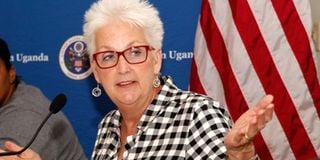US to train 270 Ugandan women entrepreneurs

The US ambassador to Uganda, Ms Deborah Malac. FILE PHOTO
The US Embassy has rolled out a training programme for women entrepreneurs across the country, admitting at least 270 women from Moroto, Kitgum, Omoro, Nwoya and Kampala districts in the first round.
The trainees will undergo a three-month business training conducted by the Academy for Women Entrepreneurs (AWE), a US government initiative that was launched in February by the State Department’s Bureau of Educational and Cultural Affairs to augment the existing schedule of projects focused on women and economic empowerment.
According to the list unveiled by the US ambassador to Uganda, Ms Deborah Malac, 70 women were selected from Kampala and 200 from the northern region for the free course that will run up to January 2020.
Ms Malac said Uganda is one of the 26 countries participating in the inaugural AWE, receiving educational resources for women entrepreneurs through guided trainings and engagement from local business leaders, to ensure small business growth and success.
She said the target is to reach 50 million women globally by 2025 through an enabling environment that reduces barriers and facilitates women’s participation in the economy.
“The average Ugandan is a 14-year-old girl living in a rural area. This girl has a one in four risk of becoming pregnant while she is a teenager, is at risk of getting HIV, might get married early, is more susceptible to domestic violence, and will probably drop out of school before secondary school,” she said.
Ms Malac added that in 2014, the Global Entrepreneurship Monitor reported that the number of female Ugandan entrepreneurs actually outnumbered their male counterparts, and that the average entrepreneur in Uganda is a young woman, with at least a secondary education, who works in the service sector.
“We want to help you, and women like you around the globe to get the support you deserve. This includes a good education, good health care, and the best possible opportunity to succeed,” she said.
“Evidence indicates that in countries where women are held back from full participation in the workplace, because of unequal access to education or other discrimination, everyone suffers from impeded economic growth and wider poverty...,” she added.
She said the White House Global Development and Prosperity Initiative aims to see women enabled in the economy by removing legal and regulatory barriers to their participation.
Ms Phiona Luswata, the lead facilitator for the programme in Uganda, said the major challenge they realised in their assessment was that most women start business out of necessity without business plans.
She, however, said the 13 course units will help women close the gaps in unchecked anomalies when starting up a business.




